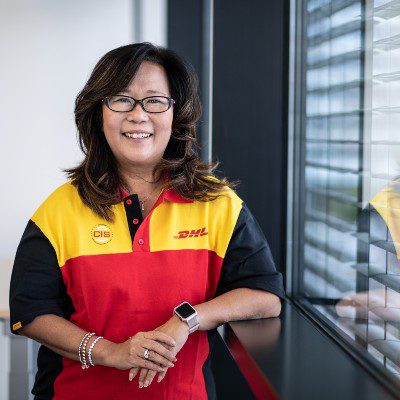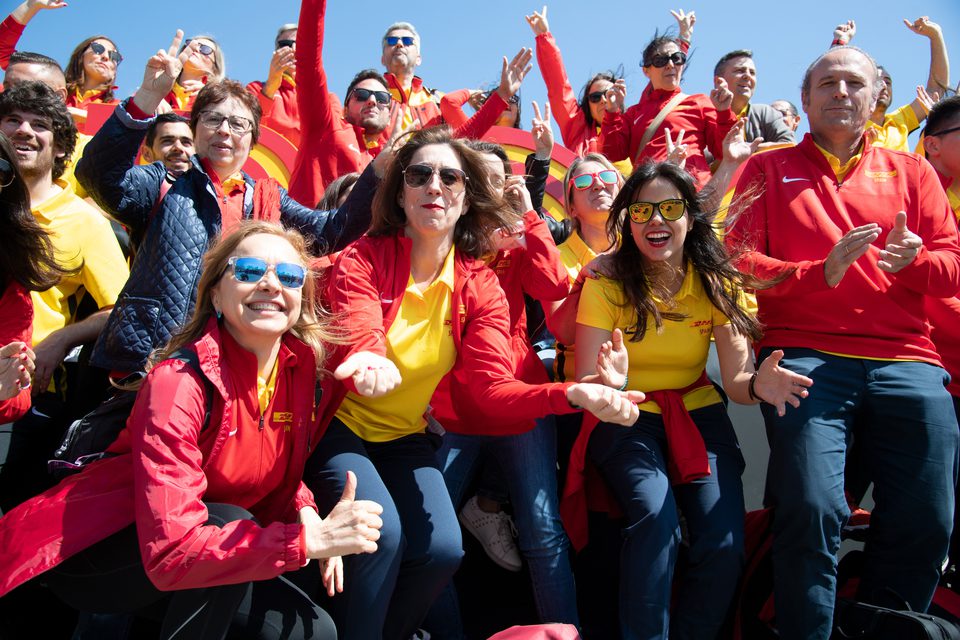Staying at number one with DHL Express
UNLEASH caught up with EVP of global HR Fadzlun Sapandi to find out how DHL Express is planning to remain the best place to work in the world.
Why You Should Care
The logistics giant is the best place to work in the world - and it wants to stay top next year.
But how does it remain in the top spot?
Read on to find out.
Ever wondered who is the best company to work for globally?
Well, Fortune and consultancy Great Place to Work has awarded this accolade to DHL Express, the parcel delivery wing of German mail and logistics giant Deutsche Post DHL group. It beat out the likes of Salesforce, SAP, EY and Adecco to reach the top spot.
The ranking is based on survey data from employees– the study looks at employee experience, trust, innovation, leadership and values – as well as analysis of employers’ diversity, equity and inclusion to ensure they are creating a ‘for all’ workplace experience.
DHL Express has been in the top ten of the Great Place to Work list since 2017 and it came in at number two in 2020, but this is the first time it has achieved the top spot. In light of this milestone achievement, UNLEASH caught up with DHL Express’ newly appointed executive vice-president of global HR Fadzlun Sapandi.
“We’re very proud of that achievement”, shares Sapandi. Central to DHL Express’ success is “having a clear purpose and mission”, which is “Connecting People. Improving Lives”.
“It is not just a slogan, but it is about really living it”, according to Sapandi.
While DHL Express has been constantly upgrading its people-first culture over the past ten years, its culture came alive when the company embraced “the spirit of togetherness”.
This was despite the challenges of COVID-19 where the majority of DHL Express’ 110,000 employees were on the frontline and couldn’t work from home.
Building connection during COVID-19
During the pandemic, “we increased our efforts… in terms of communication [and] transparency”. Sapandi explains that DHL Express ensure that those out in the field – “our real-life heroes on the frontline” who were helping deliver essential items, such as medical supplies, throughout the pandemic – were connected to the rest of the company who were able to work from home.
Sapandi notes that pre-pandemic, when everyone was working on site, DHL Express did town halls, as well as ‘appreciation weeks’. But with COVID-19, that in-person connection was no longer possible. Instead, “we needed to rely on the tools and technology that we have” – this included Zoom and the company’s internal portal SmartConnect.

Fadzlun Sapandi, executive vice-president of global HR, DHL Express.
SmartConnect “is basically a personalized channel that gives you news and information about the organization” – it also allows employees to chat to one another, including over video calls, and therefore form stronger relationships with one another.
During the pandemic, DHL Express leveraged SmartConnect even more and listened to its people about how they wanted to stay connected with their teams and the rest of the company.
Once DHL Express had ensured its people were safe and protected – with the help of PPE and contact-free deliveries – the HR team introduced virtual events. Examples include a festival for employees and their children, online yoga classes and a virtual running club.
Wellbeing is core to DHL Express. Sapandi explains that within DHL’s Fit4Work – Fit4Life programs “we have six zones of health and wellbeing, so there’s something for everyone.”
Everyone’s needs are different, so “they can just pick whatever is relevant to them” – and employees did so increasingly during COVID-19. In response, DHL Express continued to innovate and upgrade its wellbeing offerings to suit employees changing needs, relying on a range of external vendors to support here.
Finally, to ensure everyone’s hard work during the pandemic didn’t go unappreciated, DHL Express offered a €300 bonus to everyone. “We are very proud of our people [for being able to keep] the business running without any disruption”.
Inclusion, development and sustainability at DHL Express
For Sapandi, DHL Express’s commitments to diversity, equity and inclusion – “we want to be DHL for all” – was also central to it becoming the best place to work in the world.
“It important that we not only treat everyone fairly, but we empower them, support them, listen to them and make them feel valued,” notes Sapandi. This sense of inclusion and belonging was essential to DHL Express reaching the top spot, according to Sapandi.
This is echoed in a statement by the DHL group’s CHRO Thomas Ogilvie: “Our motivated diverse workforce is the key to excellent service quality and high customer satisfaction. Satisfied customers are the basis for economic success.
“This is another reason why we are convinced that it is worth actively promoting equal opportunities.”
Sapandi is also very proud of DHL Express’ commitment to the wider community and the environment. “We have programs on corporate social responsibility (CSR)” – this means DHL as a whole’s impact goes beyond the people who work there. Examples of CSR initiatives include GoGreen and GoTeach.
In terms of GoGreen, DHL is investing in having climate-neutral logistics by 2030 – this includes by relying on e-vehicles, climate-neutral buildings and looking into alternative aviation fuel. This is the first step towards its 2050 zero emissions target.
DHL also invests 1% of its net profits every year to social impact programs, as well as supports and upskills young people from disadvantaged backgrounds as a result of natural disasters through its GoTeach initiative.

Credit: DHL Express.
DHL Express is not resting on its laurels
Looking to the future, Sapandi notes that the work is not over for the logistics giant and its HR team. The company is putting a lot of hard work in to ‘reflect’ on becoming the best place to work, but also “take actions to improve where we are and [focus on] where we’d like to be.”
“Staying in the top spot is one of the challenges that we’re definitely conscious of. If we’re number two, we will be disappointed; we want to get better,” states Sapandi.
So, to remain the best place to work, DHL Express is focused on “continuously listening to…what our people want”. “Listening to that, fine tuning things as we go and keeping up that momentum” that enabled the employer to reach the top spot in the first place.
This listening will be done by DHL Express’ annual employee opinion survey. “Listening is how we drive this drive business forward”, according to Sapandi.
So far, gathering feedback has informed DHL Express’ attitudes towards the future of learning and work. In terms of learning and development, DHL Express not only relies on off-the-shelf solutions (Sapandi didn’t disclose the vendors the HR team works with), but it also has its own in-house platform.
But employee listening showed DHL Express that its employees didn’t want to learn virtually – “the majority wanted to come back to face-to-face interaction”, notes Sapandi. They wanted to learn by interacting with one another in the office. “Remote work is missing…this studying, learning new things [from each other] and having someone to talk to”.
Therefore, it is no surprise that the office will continue to play a role in DHL Express’ world of work. The logistics company is embracing hybrid working where most employees split their time 50:50 between the office and remote locations; but there will be options for greater flexibility too, and the model will vary depending on country and local practices.
Sapandi’s HR team is still “fine tuning” the model to “balance what an individual and what the company can actually offer”.
DHL Express and the ‘Great Resignation’
It wouldn’t be an UNLEASH interview without asking Sapandi about the main workplace trend: the ‘Great Resignation’. How is the world’s best employer faring in this hiring environment?
“We are, fortunately, not experiencing unnatural levels of attrition”, shares Sapandi.
She believes this is because “retention will always remain a top priority for us”, as well as career development (a major cause of the ‘Great Resignation’). Sapandi already discussed DHL Express’ learning strategy, but the company is also committed to “what we can do for [employees] individually to [help them] grow”.
This involves thinking about succession planning and looking at their career progression. This is particularly important for the younger generation – who are leading the ‘Big Quit’. “They are excited about digitalization, about what we’re doing in terms of CSR [as well as] green strategy”.
Sapandi is personally passionate about empowering future generations. She wants to use her new role at the pinnacle of HR leadership at DHL Express, the world’s best employer in 2021, to pay forward the mentorship she has experienced from others “to the new generation out there”.
Her ambition and purpose is to ensure that everyone who interacts with DHL Express – customers, candidates and employees alike – all have a great experience. She is committed to ensuring that she does everything she can to make “this great place even better”.
Watch this space to see if DHL Express can be the top employer two years in a row.
Sign up to the UNLEASH Newsletter
Get the Editor’s picks of the week delivered straight to your inbox!

Chief Reporter, UNLEASH
Allie is an award-winning business journalist and can be reached at alexandra@unleash.ai.
Contact Us
"*" indicates required fields
Partner with UNLEASH
"*" indicates required fields